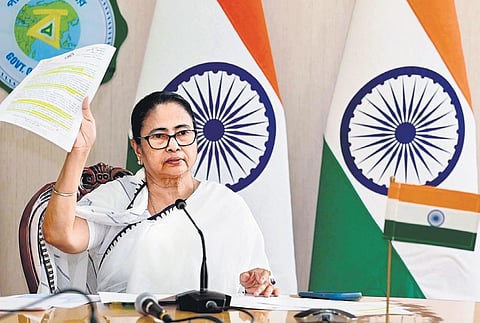

NEW DELHI: Rejecting the idea of ‘One Nation, One Election,’ Trinamool Congress (TMC) supremo Mamata Banerjee on Thursday wrote to the high-level committee saying that it would be against the basic structure of India’s constitutional arrangements.
In a letter to the panel headed by former President Ram Nath Kovind, Banerjee said that she had “basic conceptual difficulties with the principle” and also “difficulties with the methodological approach.” She also said that simultaneous polls would be a “step towards Presidentialism.”
The Centre has set up the panel on September 2 to examine and make recommendations to hold simultaneous polls to the Lok Sabha, state assemblies, and local bodies. The high-level committee recently wrote to political parties seeking their views and interaction on a “mutually agreed date” on the idea of holding simultaneous polls. Letters were sent to six national parties, 33 state parties, and seven registered unrecognised parties.
Last week, CPM general secretary Sitaram Yechury also wrote to the panel expressing the party’s disagreement on the proposal and called it “anti-democratic”. “I regret that I cannot agree with the concept of ‘One Nation, One Election’, as framed by you. We disagree with your formulation and proposal,” wrote Banerjee.
The West Bengal Chief Minister questioned the meaning of ‘One Nation’ in the context, and said, “While I understand the meaning of one nation in a historical-political-cultural sense, I do not understand the exact constitutional and structural implication of the term in the instant case. Does the Indian Constitution follow the concept of ‘One Nation, One Government’? I am afraid, it does not.” She said that unless the “basic enigma” of where the concept came from is solved, it is difficult to arrive at any firm view on the catchy phrase.
Launching a scathing criticism, she said, “You seem to be conveying some sort of a unilateral top-down ‘decision’ already taken by the Central government — to impose a structure that is against the spirit of a truly democratic and federal nation.”
Experts have pointed out that the main challenge to holding simultaneous polls in the country has been the requirement of five constitutional amendments to facilitate it. The amendment of Articles 83, 85, 172, 174, and 356 of the Constitution and certain legislative changes are required for simultaneous polls.
Voicing concerns over the complex process, Banerjee said, “Instability of a government at the Centre and the consequent impact on the Parliament should not destabilise the state legislatures, to be sure! How does your esteemed committee propose to navigate these questions?”
In the letter, Banerjee argued that states that are not expecting general elections to the assembly should not be forced to go for “premature general elections for the sake of introduction of coevality only: that will be a basic violation of the electoral trust of the people who have elected their Vidhan Sabha representatives for full five years.”
“The Central or a state government may not complete their term for various reasons, for example, a coalition breaking to a vote of no-confidence,” she said, adding that during the last 50 years, Lok Sabha has witnessed several premature dissolutions. She said fresh elections are the only option in such a situation.